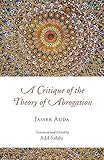A critique of the theory of abrogation [electronic resource] / Jasser Auda.
Material type: TextPublisher number: EB00834122 | Recorded BooksPublication details: [S.l.] : The Islamic Foundation, 2018.Description: 1 online resourceISBN:
TextPublisher number: EB00834122 | Recorded BooksPublication details: [S.l.] : The Islamic Foundation, 2018.Description: 1 online resourceISBN: - 9780860377603
- 0860377601
- 297.122612 23/eng/20230216
- BP130.3
- online - EBSCO
| Item type | Current library | Call number | URL | Status | Notes | Barcode | |
|---|---|---|---|---|---|---|---|
 eBook
eBook
|
Biblioteca "Angelicum" Pont. Univ. S.Tommaso d'Aquino Nuvola online | online - EBSCO (Browse shelf(Opens below)) | Online access | Not for loan (Accesso limitato) | Accesso per gli utenti autorizzati / Access for authorized users | (ebsco)2575247 |
A typical definition of abrogation found in the Jurisprudence literature is: 'The (heavenly) replacement of one juridical ruling with a later ruling.' This book surveys the subject of abrogation (Naskh) in the Qur'an, Hadith and Islamic literature, illustrating that the concept of abrogation was introduced after the Prophetic era in order to explain certain verses of the Qur'an and what has come to be termed as 'conflicting Prophetic narrations' (Mukhtalaf al-Hadith). It goes on to suggest that the 'abrogated rulings' were merely pre-Islamic cultural practices that contradicted with Islamic principles. Furthermore, the book argues that the Qur'anic verses and Prophetic narrations, which were misperceived as 'conflicting,' should be contextually situated and applied according to the wisdom behind them with the practical implication being the validation of all Qur'anic verses and (authentic) Prophetic instructions regardless of their perceived contradictions. Allowing Islamic jurisprudence to retain its flexibility within changing circumstances.
Title from resource description page (Recorded Books, viewed August 31, 2020).


